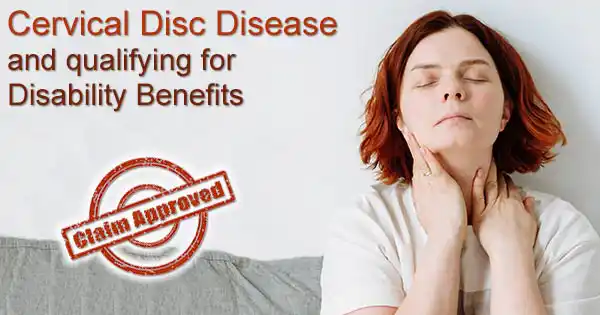Cervical Degenerative Disc Disease can qualify for Disability Benefits
Author: Attorney Lloyd Bemis
Updated: 7/17/2024
Can I get disability benefits if I am suffering from the effects of Cervical Degenerative Disc Disease (or CDDD)?
To qualify for disability benefits you must prove the compression of a nerve root in your cervical spine, along with symptoms like radiating pain, numbness, muscle fatigue, and poor reflexes. Inability to use hands for fine motor movements is also a requirement. Medical evidence required by the SSA includes results of spinal examinations, specific tests for the affected nerve root, medical imaging showing compromise, and records of treatments received. Additionally, statements from medical providers summarizing the condition’s effects on daily activities, employment records, and statements from employers, and family members should be submitted with the application.
If the listing requirements are not met, applicants may still qualify for disability benefits if the inability to work can be proven.
Cervical Degenerative Disc Disease and qualifying for Disability Benefits
Cervical degenerative disc disease (or CDDD) is a common cause of neck pain, as well as pain that radiates down the shoulders to the arms and hands. In more severe cases this condition can go beyond mere discomfort and lead to a loss of mobility that significantly affects a person’s professional and personal life. Roughly 60% of individuals above the age of 40 experience some level of degenerative disc disease. While CDDD itself is not uncommon, the related symptoms, like cervical radiculopathy, affect a smaller percentage of people, with an estimated point prevalence of 3 individuals out of 1,000 (Bigos et al., 1992). These statistics paint a picture of a widespread condition, though the severity of symptoms and their impact on daily life vary considerably.
Sarah gripped the armrests of her chair, wincing as a jolt of pain shot through her neck and down her arm. It had been like this for months, a constant dull ache punctuated by sharp, debilitating spasms. Cervical disc degenerative disease, the doctor had said, is a result of years of wear and tear. The once-simple tasks of typing at her desk or driving to work had become herculean efforts. Now, facing increasing medical bills and the daunting reality of her limited ability to work, Sarah knew she had to make a difficult decision: apply for disability benefits. It was a path she never imagined taking, but the time had come to pursue every avenue possible to make her life better.
If you are one of the unfortunate few who have struggled to maintain employment due to CDDD, you may wish to explore whether to apply for disability benefits or not, and what you will need to qualify.
Qualifying for SDDI with Cervical degenerative disc disease
To qualify for Social Security Disability (SSDI) you will need to satisfy both the financial and medical requirements set forth by the SSA. If you do not meet those requirements, you will be denied benefits.
Financial Requirements:
Before you are eligible for Social Security disability benefits, you must satisfy some basic financial requirements.
You must: 1) have a disability that has lasted or is expected to last 12 months; 2) you must have worked in a job where you paid Social Security taxes long enough and recently enough; and 3) you must not earn more than $1,620 per month in 2025. This figure is referred to as SGA or Substantial Gainful Activity. However, if you are visually impaired, the SGA threshold increases to $2,700 per month. If you earn more than SGA, your claim will be denied, and if you have not accumulated enough work credits due to insufficient recent work history, your claim will be denied. (go here for an explanation of work credits ->)
If you think you meet the financial requirements, you should then check SSA’s medical requirements to see if you satisfy those criteria.
Medical Requirements:
The Social Security Administration has a listing of disabling impairments called the Blue Book.
This manual contains a list of medical conditions and illnesses Social Security considers severe enough to impact one’s ability to work. This guide is divided into sections, each providing information on different health conditions and the level of impairment necessary to be eligible for disability benefits. While some disabling conditions are fairly easy to prove, others can be more challenging. The criteria to qualify can be confusing, but fortunately there are medical professionals and legal advocates available to provide guidance and assistance in navigating this complex process.
In April 2021, the Social Security Administration updated its listings under Section 1 Musculoskeletal Disorders.
Cervical disc degenerative disease is now evaluated under Section 1.15 Disorders of the skeletal spine resulting in compromise of a nerve root(s). A person with a compromised nerve root of the cervical spine may experience numbness, tingling, or pain in the neck, shoulder, arm, hand, or fingers, called “cervical radiculopathy.” If the inflammation or impingement of the nerve root is severe, it could impact an individual’s fine motor skills, making it difficult for them to use their hands and fingers to type, write, or hold and lift objects. In order to qualify for Social Security Disability Income under this listing, you must prove that a nerve root is compressed, and that you have radiating pain, tingling, numbness, muscle fatigue and poor reflexes. Also, you must not be able to use either hand for fine and gross motor movements like those described above.
Social Security will want to see the following medical evidence:
- Results of a spinal examination that tests range of motion, strength and sensations.
- Tests specific to the cervical nerve root affected, such as a Spurling test (a test that reproduces symptoms by compressing the affected nerve root).
- Medical imaging such as MRIs, x-rays, and CT scans showing compromise of a cervical nerve root.
- Records of treatments received, including how long treatments lasted and results of treatments.
With your application you should also submit:
- Statements from your medical providers summarizing your condition and detailing its effects on your daily activities, particularly work-related tasks;
- Employment records listing sick days, short-term disability leave, and family medical leave; and
- Statements from employers, co-workers and family members.
If you do not meet the requirements of the listing, you may still qualify for disability benefits if you are unable to work.
Social Security will conduct a residual functional capacity assessment (RFC) to evaluate your limitations. Social Security will also consider your age, education, and job experience to see if there are any jobs you are capable of performing.
Among the functions they will test are
- Your ability to turn or bend your neck (for example, to look at a computer screen);
- Your ability to lift objects that weigh more than 20 lbs.;
- Your coordination and ability and use your arms and hands;
- If and how much pain interferes with your concentration.
Additionally, you may be eligible for Social Security Disability benefits if you have another impairment; for example, arthritis.
Applicants often have more than one illness or injury that prevents them from working full time. By itself one disorder may not meet the requirements of an impairment as stated in Social Security’s Blue Book. However, if an applicant has multiple medical conditions, Social Security must consider how those health issues, combined together, limit an applicant’s ability to hold a job and perform necessary daily tasks.
“Once Social Security determines the limitations caused by your condition, they will employ a vocational expert to assess whether a person with these limitations is employable. Most vocational experts will find a person to be unemployable if their condition or the treatment rendered for the condition causes the person to regularly be absent two or more days a month or be “off-task” 15% or more of the workday.”
Filing a claim for disability benefits and getting approval can be a long journey, but you can take the first steps today.
Feel free to call us for a free consultation to discuss your case and options. Even if you don’t hire us, we are happy to help you make the best choices for your own individual situation.
A Lubbock-area client suffered from degenerative joint disease of the right hip and left heel.
He had a history of osteoarthritis and multiple orthopedic surgical interventions including right ankle repair, lumbar fusion, right rotator cuff repair, and left calcaneal fracture. He also had a Class 1 heart disease. Medical records supported sedentary restrictions and limitations; our client was not expected to improve. He had a limited ability to sit, stand, or walk, only capable of doing those activities 33% of the time or less. Accordingly, the client’s treating physician stated that he would not ever be able to engage in full-time employment. The Social Security Administration (SSA) agreed.
Reliance Standard denied his claim in spite of this, but benefits were reinstated after we appealed.
One client, from Wichita Falls, Texas, stopped working due to a degenerative spinal condition and filed for short term disability through AT&T, which was both her employer and her LTD insurance provider.
She was under the medical care of a board certified neurologist and remained on short term disability until those benefits expired. At that time, her claim was transitioned to long term disability under AT&T’s Disability Income Plan. Her doctor determined she was totally disabled, both from her own occupation at the phone company, as well as any occupation within the open labor market in which she resided. Her employer was acquired by another which reviewed and denied her claim.
She hired us, and we were able to settle her claim.
An Austin client suffered from severe back pain resulting from L4-5 disc disease, as well as bilateral facet/SI joint pain.
His medications included Celebrex, Sanaflex, Norco and others. He is permanently disabled and will never be able to return to work. Indeed, that is what each of his physicians had stated and this was the finding reached by the Social Security Administration. In its denial letters and the appeal denial letters, Reliance Standard showed a lack of deference to the findings of our client’s doctors and surgeons and, in fact, a total reliance on its internal claims review personnel to support its denial. He was unable to sit or stand for more than 30 minutes at a time and spent most of his days in bed due to pain. He was unable to drive due to pain and medication.
We won after taking his case to trial, with benefits reinstated.
Your Free Initial Consultation
Call now:
At Bemis, Roach and Reed, if we can't help you, we will try to find the right attorneys for you.
We offer each of our prospective clients a free no obligation one hour phone or office consultation to see if we can help you and if you are comfortable with us. We know how difficult a time like this can be and how hard the decisions are. If we can be of assistance to you and help you find a solution to your issue we will, even if that means referring you to another attorney.
Let's get you Started:
If you could provide us with some basic information about your claim we will get right back with you with a free case evaluation and schedule your Free Consultation Today.
You can also email us at: contact@brrlaw.com
Disability Benefits FAQs
Social Security has some basic financial requirements.
Before you are eligible for Social Security disability benefits, you must satisfy some basic financial requirements. You must: 1) have a disability that has lasted or is expected to last 12 months; and 2) you must have worked in a job where you paid Social Security taxes long enough and recently enough; and 3) you must not earn more than Substantial Gainful Activity (SGA), which is $1,620 per month in 2025 for nonblind applicants and $2,700 per month for blind applicants.
Basic SSDI Requirements –>
You may also be eligible for Social Security Disability benefits if you have another medical condition.
One disorder alone may not meet the criteria of an impairment as stated in Social Security’s Blue Book, but if you have more than one medical condition, Social Security must consider how those health issues combined limit your ability to hold a job and perform necessary daily tasks.
Disability for Multiple Impairments –>
If you are 55 or older or have another medical condition you may get approval.
Applicants who are 55 or older often fall under a grid rule, which means they are not expected to learn a new job.
Disability for those over 55 –>
How much does a disability lawyer cost?
Disability lawyers charge on a contingency basis, meaning they only collect a fee if you win your case and are awarded disability benefits. Federal law sets the amount that attorneys can charge which is based on a percentage of past-due benefits you are owed up to a fixed amount, whichever is less. So, there are no out-of-pocket costs for you.
Disability Lawyer Costs –>
Should you file a claim?
If you believe that you meet Social Security’s medical and financial requirements, you should apply for benefits. If you are still unsure or would like to talk to someone, please contact us at 512-454-4000. We are always ready to take your call and discuss your options with you free of charge. We are happy to help folks just like you find the best solution for their personal situation.
How do I file for Social Security Disability benefits?
Once you have decided to file a claim, you can take the first step and apply for Social Security Disability benefits in person at your local Social Security Administration office, online, or over the phone.
How to Apply for SSDI –>
Appealing denied benefits
Most who file are denied initially. That doesn’t mean you won’t qualify; you just need to file an appeal.
There are four steps to the Social Security appeal process.
SSDI Appeals Process –>
Do I need a disability attorney for SSDI?
You may certainly file a claim on your own, but evidence shows that your chances for approval are increased significantly if you have legal representation.
Do I need an SSDI attorney–>
What if I don’t qualify for SSDI?
If you haven’t worked long enough to earn enough work credits, or if you earn too much income, you may be eligible for disability benefits through another Social Security program, such as Supplemental Security Income (SSI), or from a long-term disability insurance plan through your employer or a privately purchased policy.
What is Supplemental Security Income or SSI?–>
I have long-term disability insurance – should I file a claim?
Absolutely – you should file a claim as soon as you become disabled.
LTD Disability Appeals Process–>
Disability benefits are an important source of income for those who are unable to work. If you are not able to work due to accident or illness, you may be eligible for Social Security Disability or Long Term Disability benefits. If you have applied for benefits and been denied, contact the attorneys at Bemis, Roach and Reed for a free consultation. Call 512-454-4000 and get help NOW.

Kind Words from Our Clients
“The attorneys and staff at Bemis, Roach & Reed have provided me and my husband, Jeff, with stellar advice, care, and service. They made navigating the SSDI process easy, painless, and as timely as possible. During this difficult time in our lives it was a tremendous relief to know they were on our side and keeping us updated on next steps and timelines. We also had questions about my husband’s long term disability insurance and they helped us get those questions answered and resolved without any additional fee. I highly recommend Bemis, Roach & Reed.” – Kelli G
“I needed a lawyer for my case and had googled best lawyers. They came up first on my list and decided to give them a call. From the moment I called I knew I chose the right people. They said they would fight for me and fight they did. They knew what they were doing and kept good communication throughout the process. If you need someone that will listen, understand, and fight then these are the people. HIGHLY RECOMMEND.” – Marcel L.
“I’ve had a great experience working with Bemis, Roach & Reed for my disability case. I spent two years fighting on my own, until I was informed to look for a disability lawyer. Right away, sending in questions was a breeze, and from the moment my case was accepted, everything became a major weight off my shoulders. My newest appeal was filed for me, my medical records and case history sorted for me, and I could finally focus on my appointments and treatment with a little less worry. Everything was explained to me in a way that made sense, the process was set out in an easy to understand way. And, just like that, at the beginning of July 2023, my claim was accepted!” – Sunshinemutt







